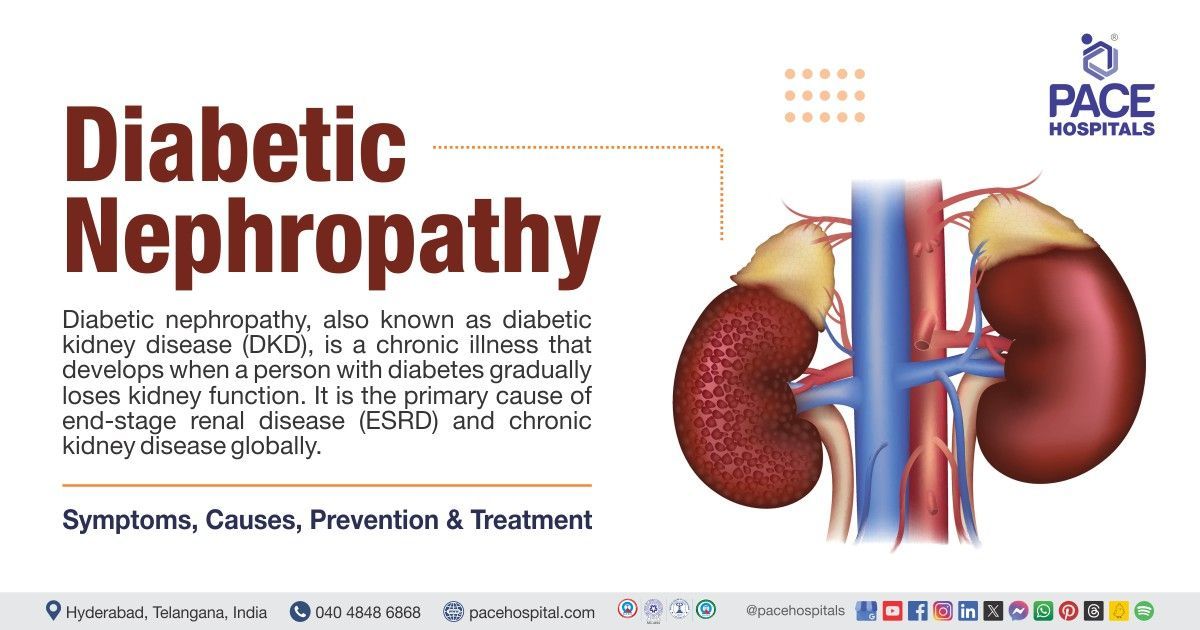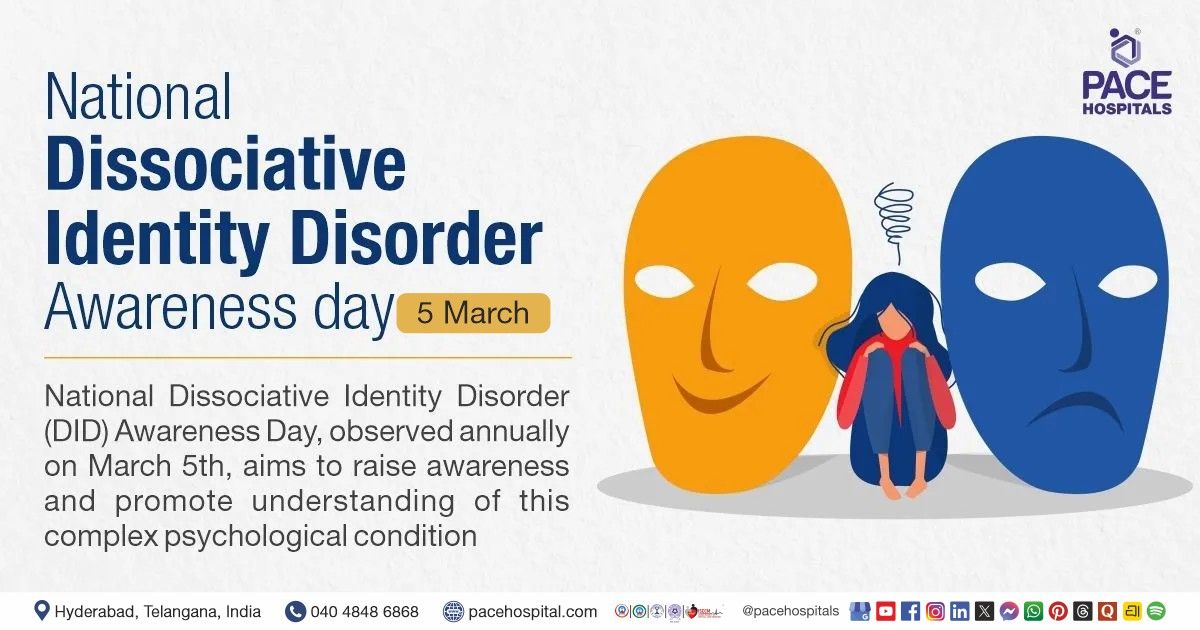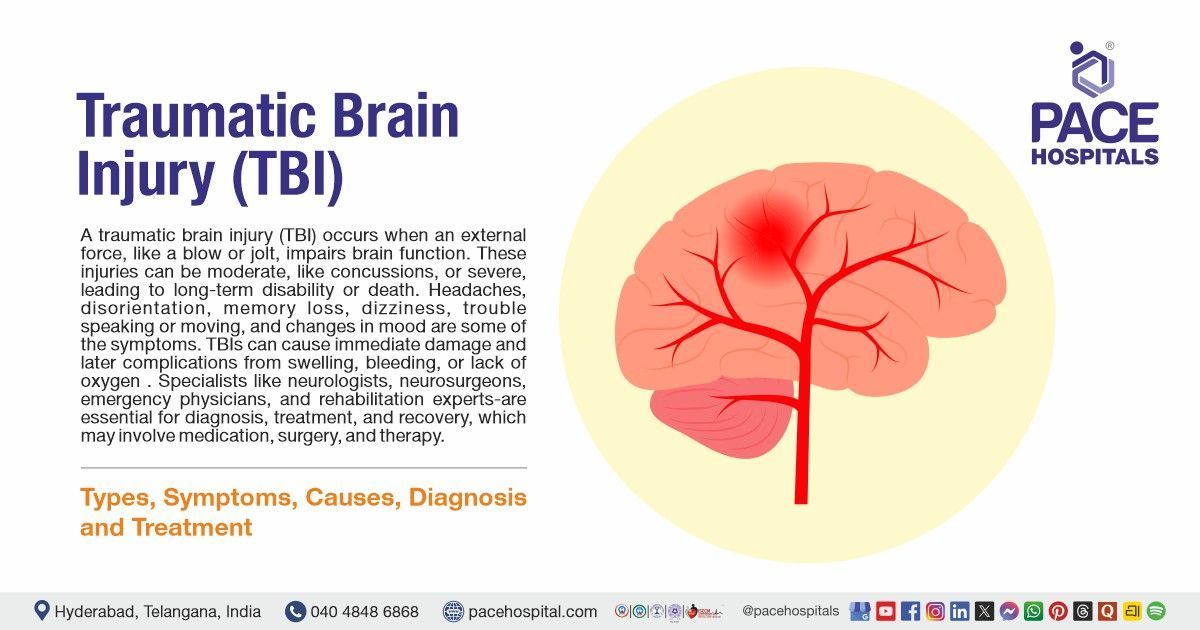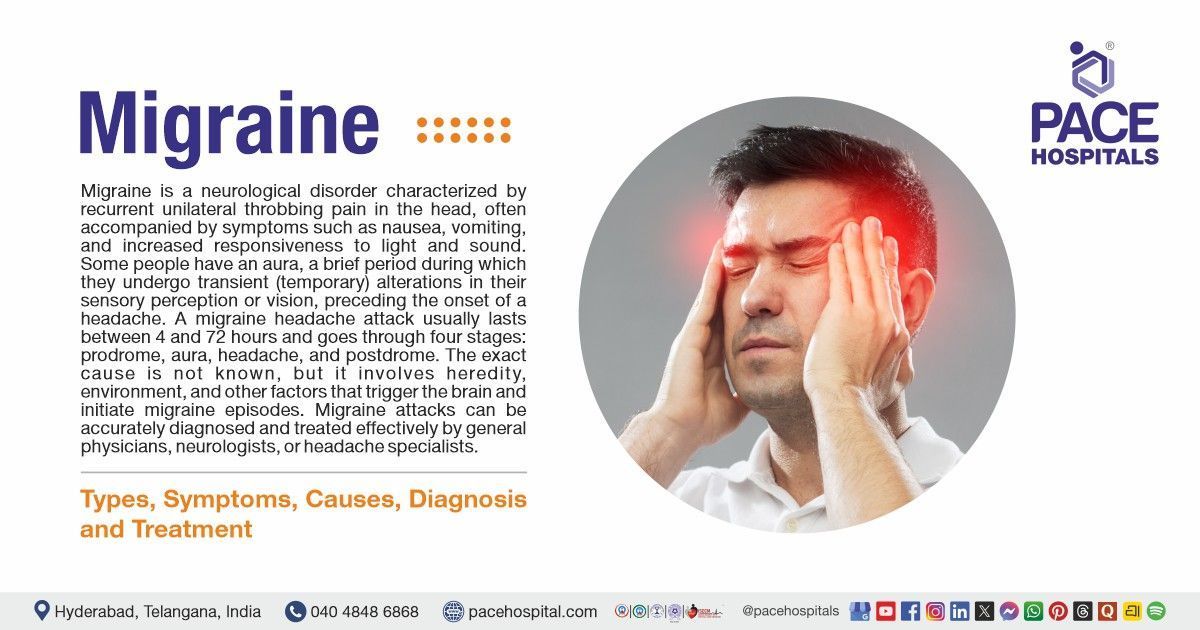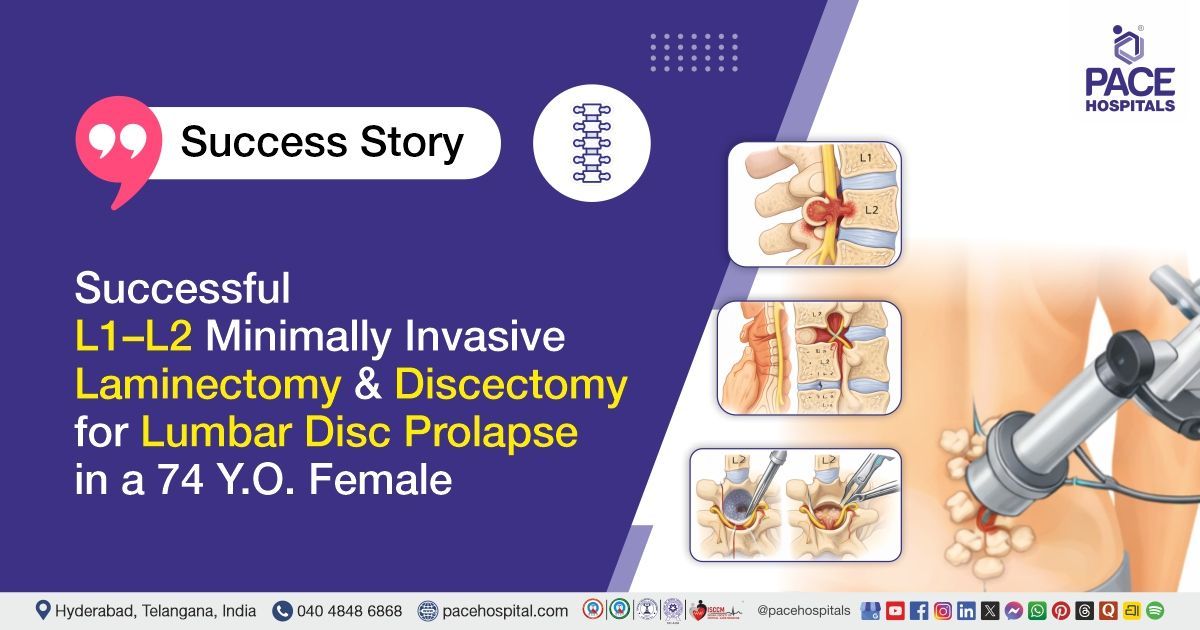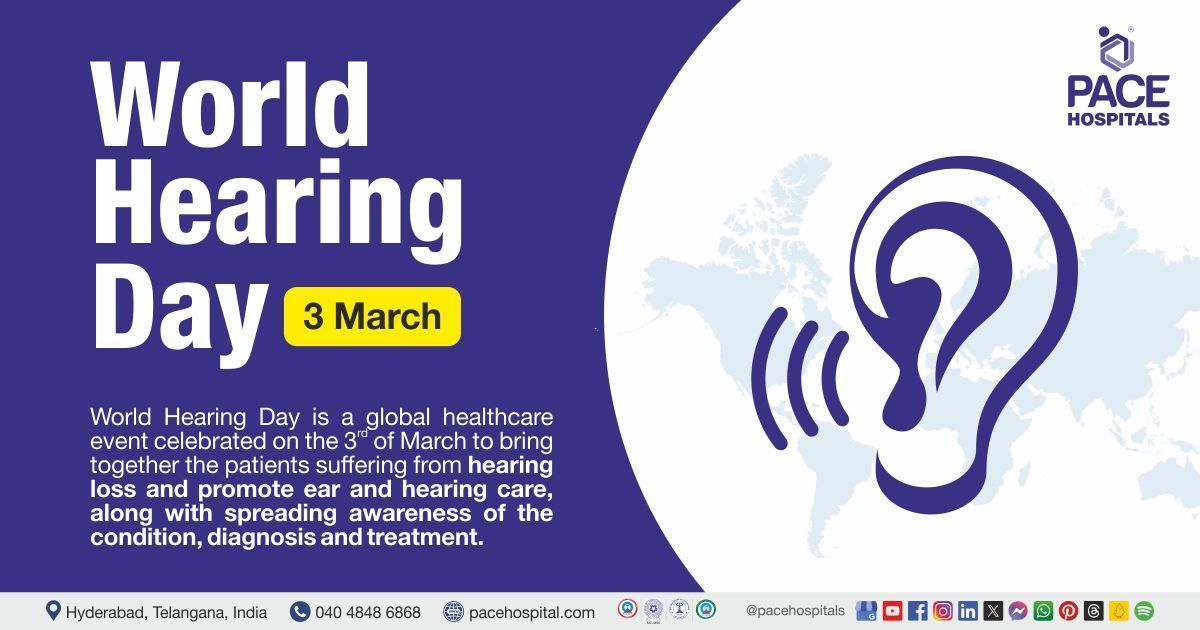Best Doctor for Diabetic Nephropathy Treatment in Hyderabad for Advanced Kidney Care
PACE Hospitals
✅ Recommended by 9,452 Happy Patients. Get hassle-free online consultation with Diabetic Nephropathy Doctors.
Dr. A Kishore Kumar
MD (Medicine) (JIPMER), DM (Nephrology) (AIIMS, New Delhi)
Experience : 12+ years
Consultant Nephrologist and Renal Transplant Physician
Specialist
Kidney Transplantation, Glomerular Disease, Chronic Kidney Disease, Acute Kidney Injury, Hemodialysis, Peritoneal Dialysis, Autoimmune Kidney Diseases, Genetic Kidney Diseases, Critical Care Nephrology
Expertise
Permcath Insertions, Kidney Biopsy, Peritoneal Dialysis Catheter Insertion
Consultation Details
Languages Spoken: English, Telugu, Hindi
Timing: Mon to Sat - 10 AM to 6 PM
Location: PACE Hospitals, HITEC City
Dr. Tripti Sharma
MBBS, MD (General Medicine), DM (Endocrinology, Diabetes & Metabolism)
Experience : 15+ years
Endocrinologist (Adult & Paediatric), Physician & Diabetologist
Specialist
Human metapneumovirus (HMPV), Coronavirus disease (COVID-19), Hypertension caused by hormonal imbalances, Diagnosing and treating various endocrinology-related health conditions such as thyroid disorders (hypothyroidism, hyperthyroidism, and goitre), diabetes (type 1 diabetes mellitus, type 2 diabetes mellitus, and gestational diabetes), adrenal disorders (Cushing’s syndrome and Addison’s disease), pituitary gland disorders (acromegaly, prolactinoma, growth hormone deficiency, etc.), infertility (male and female), hypertension, obesity, dyslipidaemia, osteoporosis, puberty and growth disorders, polycystic ovary syndrome, hypogonadism, menstrual and other hormonal disorders.
Expertise
Management of Fever of unknown origin, Management of Sepsis & Multiorgan failure, Diabetes mellitus, Hypertension, Thyroid Disorder, Pregnancy Induced Hypertension, Dyslipidemia & hyperlipidemia, Anaemia management, Weight loss & Fatigue Syndromes, HIV treatment, Lung diseases (Asthma, Empyemathorasis, Bronchiectasis Treatment, Interstitial Lung Disease Treatment), Allergy and Immunological Disorders, Anaemia and Blood Disorders, Rheumatology and Joint Related Disorders, COVID-19 / Swine Flu, Endocrinological Disorders, Cardiac problems, Liver & Kidney disorders, Infectious disease, Autoimmune disease, Haematological disorders, Malabsorption syndromes, Weight Reduction management, Diagnostic Dilemmas, Pyrexia of unknown origin (PUO)
Consultation Details
Languages Spoken: English, Hindi, Telugu
Timing: Mon to Sat - 9 AM to 5 PM
Location: PACE Hospitals, HITEC City
Dr. Mounika Jetti
MBBS, MD (General Medicine)
Experience : 9+ years
Consultant General Physician and Diabetologist
Specialist
Coronavirus disease (COVID-19), HMPV, Hypertension (high blood pressure), Thyroid disorders, Diabetes, Obesity, Weight loss, Infectious diseases, Autoimmune diseases, Immunisation protocols, Anaemia, Cardiac and Renal issues and many other general conditions.
Expertise
High blood pressure treatment and management, Chronic disease management, Treatment of diabetes and its complications, Fever of unknown origin (FUO), thyroid disorders, dyslipidemia, tuberculosis, anaemia, asthma, obesity, COPD, lifestyle disorders, HIV and Its management, innovative treatment approaches and preventive healthcare strategies.
Consultation Details
Languages Spoken: English, Hindi, Telugu
Timing: Mon to Sat - 11 AM to 8 PM
Location: PACE Hospitals, HITEC City
Dr. Snigda Panuganti
MBBS, MD (General Medicine)
Experience : 7+ years
Consultant General Physician and Diabetologist
Specialist
Dr. Snigda Panuganti specializes in diagnosing and managing a wide range of acute and chronic health conditions, including:
- Diabetes & Lifestyle Diseases (Hypertension, Dyslipidemia, Obesity)
- Thyroid Disorders (Hypothyroidism, Hyperthyroidism)
- Electrolyte & Metabolic Disturbances
- Anaemia & Thrombocytopenia
- Chronic Kidney Disease (CKD) & Acute Kidney Injury (AKI)
- Heart Failure, Atrial Fibrillation & Deep Vein Thrombosis (DVT)
- Stroke Recovery & Geriatric Medicine
- Chest Infections, Pneumonia & Tuberculosis
- Tropical & Infectious Diseases (Dengue, Malaria)
- Gastrointestinal & Urinary Tract Infections
- GERD, Headaches & Fatigue Syndromes
- Seizure Disorders
- Fever of Unknown Origin (PUO)
- Multi-Organ Dysfunction & Critical Illness
- Sepsis & Systemic Infections
Expertise
With 7+ years of experience, Dr. Snigda Panuganti provides expert care in:
- Acute & Inpatient Medical Care
- Multimorbidity & Elderly Care Management
- Preventive Medicine & Adult Vaccination
- Critical Illness & Emergency Management
- Diagnostic Evaluation of Complex Cases
- Chronic Disease Management & Follow-Up Care
- Lifestyle & Weight Management Programs
- Patient Education & Health Counselling
Consultation Details
Languages Spoken: English, Hindi, Telugu
Timing: Mon to Sat - 10 AM to 7 PM
Location: PACE Hospitals, HITEC City
Choose the Right Diabetic Kidney Disease Treatment Doctor in Hyderabad for Better Kidney Health
PACE Hospitals is renowned for having the Best Doctor for diabetic nephropathy treatment in Hyderabad, India. Our highly experienced nephrologists specialize in the accurate diagnosis and treatment of diabetic nephropathy, also known as diabetic kidney disease (DKD)—a progressive kidney condition caused by long-standing diabetes.
Our team adopts a patient-focused approach to manage all stages of diabetic nephropathy, offering personalized care based on the severity of kidney damage, blood sugar levels, and co-existing health conditions. Common symptoms include swelling in the legs, high blood pressure (Hypertension), fatigue, and changes in urination patterns. Early diabetic nephropathy diagnosis plays a crucial role in slowing the disease progression and improving outcomes.
We are equipped with advanced diagnostic tools including urine albumin tests, glomerular filtration rate (GFR) assessments, renal imaging, and kidney biopsies—ensuring an accurate evaluation of kidney function and disease staging. Whether it's early-stage microalbuminuria or advanced renal impairment, our diabetic kidney disease treatment doctors in Hyderabad design evidence-based care plans tailored to each patient's condition.
Our comprehensive diabetic nephropathy treatment includes optimal blood sugar control, blood pressure management, use of ACE inhibitors or ARBs, lifestyle modifications, dietary counseling, and, when necessary, preparation for renal replacement therapies such as dialysis or kidney transplantation.
With a commitment to compassionate care, clinical excellence, and long-term kidney health, PACE Hospitals stands out as a trusted choice for those seeking a diabetic nephropathy treatment doctor in Hyderabad. We provide holistic, stage-specific care for patients with diabetic kidney disease (DKD) to preserve renal function and improve quality of life.
Frequently Asked Questions (FAQs) on Diabetic Nephropathy
Can diabetic nephropathy be reversed?
In most cases, diabetic nephropathy cannot be completely reversed, especially in advanced stages. However, early-stage disease can be managed effectively through tight control of blood sugar and blood pressure. With timely intervention from a diabetic nephropathy treatment doctor at PACE Hospital, Hyderabad, further kidney damage can be slowed or even halted.
When should we suspect diabetic nephropathy in diabetes patients?
Doctors may suspect diabetic nephropathy when urine tests show protein or when kidney function begins to decline. Screening is advised at the time of diagnosis for type 2 diabetes and after five years for type 1 diabetes. If abnormalities are found, referral to the top diabetic nephropathy treatment doctor in Hyderabad, India such as those at PACE Hospitals, is crucial for early intervention.
How to prevent diabetic nephropathy?
Preventing diabetic nephropathy involves maintaining good blood sugar and blood pressure control—key factors in protecting kidney function. Regular screenings for protein in urine and kidney function tests enable early diabetic nephropathy diagnosis. Lifestyle changes such as a balanced diet, regular exercise, avoiding tobacco, and reducing salt intake can lower the risk. At PACE Hospitals in Hyderabad, our specialists help patients implement kidney-friendly routines to slow the progression of diabetic kidney disease (DKD).
Who treats diabetic nephropathy?
Diabetic nephropathy is managed by a multidisciplinary team including general physicians, endocrinologists, and nephrologists. These healthcare providers work together to control blood sugar, blood pressure, and slow disease progression. At PACE Hospitals, patients receive care from some of the Best Doctors for diabetic nephropathy treatment in Hyderabad, India offering a collaborative and customized approach.
What is diabetic nephropathy?
Diabetic nephropathy, also known as diabetic kidney disease (DKD), is a type of chronic kidney damage caused by long-standing
diabetes. High blood sugar levels over time harm the small blood vessels (glomeruli) in the kidneys, reducing their ability to filter waste from the blood. Without timely diabetic nephropathy treatment, the condition may progress through various stages and ultimately lead to kidney failure. Early detection and care from
experienced diabetic nephropathy doctors can help slow its progression.
What is the first sign of diabetic nephropathy?
The earliest sign of diabetic nephropathy is the presence of small amounts of albumin (protein) in the urine—a condition known as microalbuminuria. This can be detected through a urine test, often before symptoms become noticeable. Routine screening is essential for timely diabetic nephropathy diagnosis, especially for those living with diabetes.
How is diabetic nephropathy diagnosed?
Diabetic nephropathy diagnosis involves
urine tests to detect protein (albumin), blood tests to assess kidney function (creatinine, eGFR), and monitoring blood pressure. Yearly screening is recommended for all diabetic patients. At PACE Hospitals in Hyderabad, we utilize advanced diagnostics to detect early signs and initiate appropriate
diabetic kidney disease treatment.
Why does diabetes cause nephropathy?
Diabetes can lead to diabetic kidney disease by damaging the tiny filtering units in the kidneys. Prolonged high blood sugar causes these filters to become thickened and leaky. Over time, protein leaks into the urine, and kidney function declines. Additionally, high blood pressure—a common condition in diabetics—can worsen kidney damage and accelerate the disease across its stages.
How is diabetic nephropathy treated?
Diabetic nephropathy treatment focuses on protecting kidney function and slowing disease progression. This includes controlling blood sugar, managing blood pressure (often with ACE inhibitors or ARBs), adopting a kidney-friendly diet, and avoiding substances that strain the kidneys. Consultation with the
Best Doctor for diabetic nephropathy treatment in Hyderabad, India at PACE Hospitals ensures a personalized care plan for each stage of the disease.
What are the symptoms of diabetic nephropathy?
Early diabetic nephropathy often has no noticeable symptoms. As the disease progresses, individuals may experience swelling in the legs or face, fatigue, loss of appetite, nausea, and dry or itchy skin. In advanced stages, symptoms of kidney failure like confusion or drowsiness may occur. Regular check-ups with a
diabetic nephropathy doctor at PACE Hospitals help detect issues before symptoms arise.
How do ACE inhibitors help in diabetic nephropathy?
ACE inhibitors are commonly prescribed for
diabetic kidney disease treatment because they lower blood pressure and reduce pressure within the kidneys' filtering units. This helps minimize protein loss in urine and delays the progression of diabetic nephropathy stages. These medications are effective even in patients whose blood pressure is within the normal range.
How does diabetes cause nephropathy?
Diabetes contributes to nephropathy by damaging the glomeruli—the filtering units of the kidneys. Persistent high blood sugar thickens and scars these structures, allowing protein to leak into the urine and reducing waste filtration efficiency. Elevated blood pressure in diabetics further accelerates the kidney damage seen in diabetic kidney disease (DKD).
Does nephropathy occur despite good diabetes control?
Yes, diabetic nephropathy can still occur even with well-controlled blood sugar. Factors like genetics, blood pressure, and other medical conditions may contribute. While proper diabetes management reduces the risk significantly, it doesn’t eliminate it completely. Regular check-ups with the trusted diabetic nephropathy treatment doctor are essential for early detection and intervention.
What is proteinuria in diabetic nephropathy?
Proteinuria diabetic nephropathy refers to the presence of high levels of protein in the urine due to advanced kidney damage from diabetes. It’s a sign that the filtering units of the kidneys are severely compromised. Proteinuria is a critical indicator used by diabetic nephropathy doctors at PACE Hospitals to assess disease severity and determine the appropriate diabetic kidney disease treatment plan.
What to eat in diabetic nephropathy?
People with diabetic nephropathy should follow a renal-friendly diet that reduces kidney workload. This typically includes limiting sodium, potassium, and animal protein intake. A registered dietitian can personalize a plan that supports both diabetes and kidney health. At PACE Hospitals, Hyderabad, we provide tailored nutrition counseling as part of our comprehensive diabetic nephropathy treatment approach.
Why does GFR decrease in diabetic nephropathy?
In diabetic nephropathy, the glomerular filtration rate (GFR) decreases as the kidney’s filters become thickened and scarred. This reduces the kidney’s ability to cleanse the blood, leading to waste buildup. A declining GFR reflects worsening kidney function and is a key measure used by diabetic kidney disease treatment doctors to guide therapy.
Can antibiotics be given in diabetic nephropathy?
Yes, antibiotics can be prescribed for infections in patients with diabetic nephropathy, but they must be chosen and dosed carefully. Reduced kidney function affects how medications are processed. A diabetic nephropathy doctor at PACE Hospitals will evaluate kidney function before prescribing antibiotics to ensure safety and effectiveness.
What is diabetic nephropathy screening?
Diabetic nephropathy screening includes urine tests to detect albumin (microalbuminuria) and blood tests to assess kidney function (eGFR). It helps identify early diabetic kidney disease (DKD) before symptoms develop. Screening should begin at the time of type 2 diabetes diagnosis and after five years for type 1, followed by annual monitoring. Early detection enables timely diabetic nephropathy treatment and better outcomes.
What is the pathophysiology of diabetic nephropathy?
The pathophysiology of diabetic nephropathy involves both metabolic and hemodynamic disturbances caused by chronic hyperglycemia. These include glomerular hyperfiltration, oxidative stress, and inflammation, which lead to structural kidney changes like glomerular basement membrane thickening, podocyte injury, and fibrosis. Over time, these changes result in progressive diabetic kidney disease and may lead to end-stage renal failure if not properly managed.
What is microalbuminuric diabetic nephropathy?
Microalbuminuric diabetic nephropathy is an early stage of diabetic kidney disease, where small amounts of albumin begin leaking into the urine. This stage—known as microalbuminuria—often occurs before any visible symptoms and indicates early kidney damage. Timely detection and intervention by a skilled diabetic nephropathy treatment doctor at PACE Hospitals, Hyderabad can significantly slow disease progression and preserve kidney function.
What our patients have to say
Experts Perspective
Related Resources
Why choose PACE Hospitals?
- A Multi-Super Speciality Hospital.
- NABH, NABL, NBE & NABH - Nursing Excellence accreditation.
- State-of-the-art Liver and Kidney transplant centre.
- Empanelled with all TPAs for smooth cashless benefits.
- Centralized HIMS (Hospital Information System).
- Computerized health records available via website.
- Minimum waiting time for Inpatient and Outpatient.
- Round-the-clock guidance from highly qualified super specialist doctors, surgeons and physicians.
- Standardization of ethical medical care.
- 24X7 Outpatient & Inpatient Pharmacy Services.
- State-of-the-art operation theaters.
- Intensive Care Units (Surgical and Medical) with ISO-9001 accreditation.
Share on
Request an appointment
Fill in the appointment form or call us instantly to book a confirmed appointment with our super specialist at 04048486868






